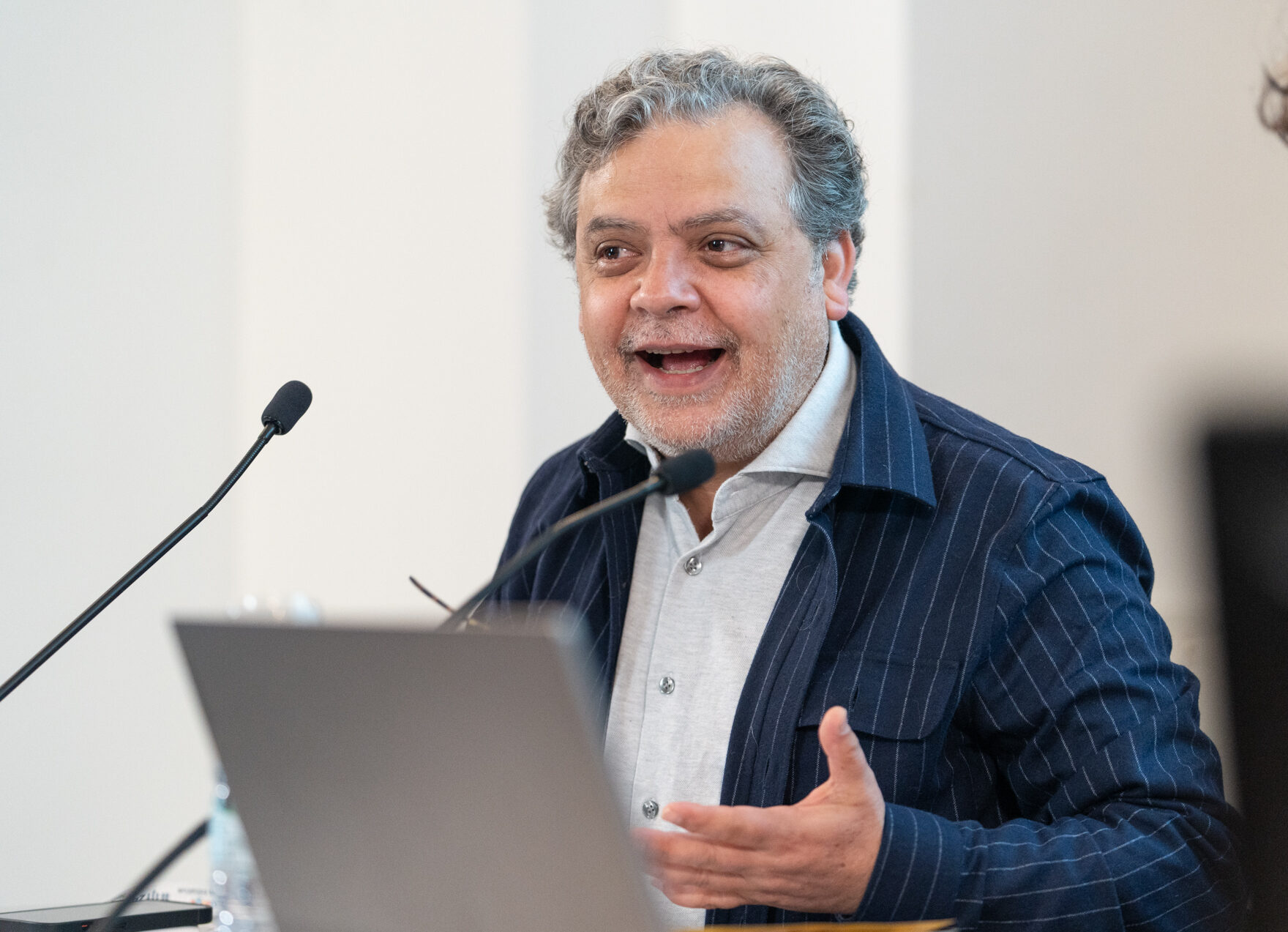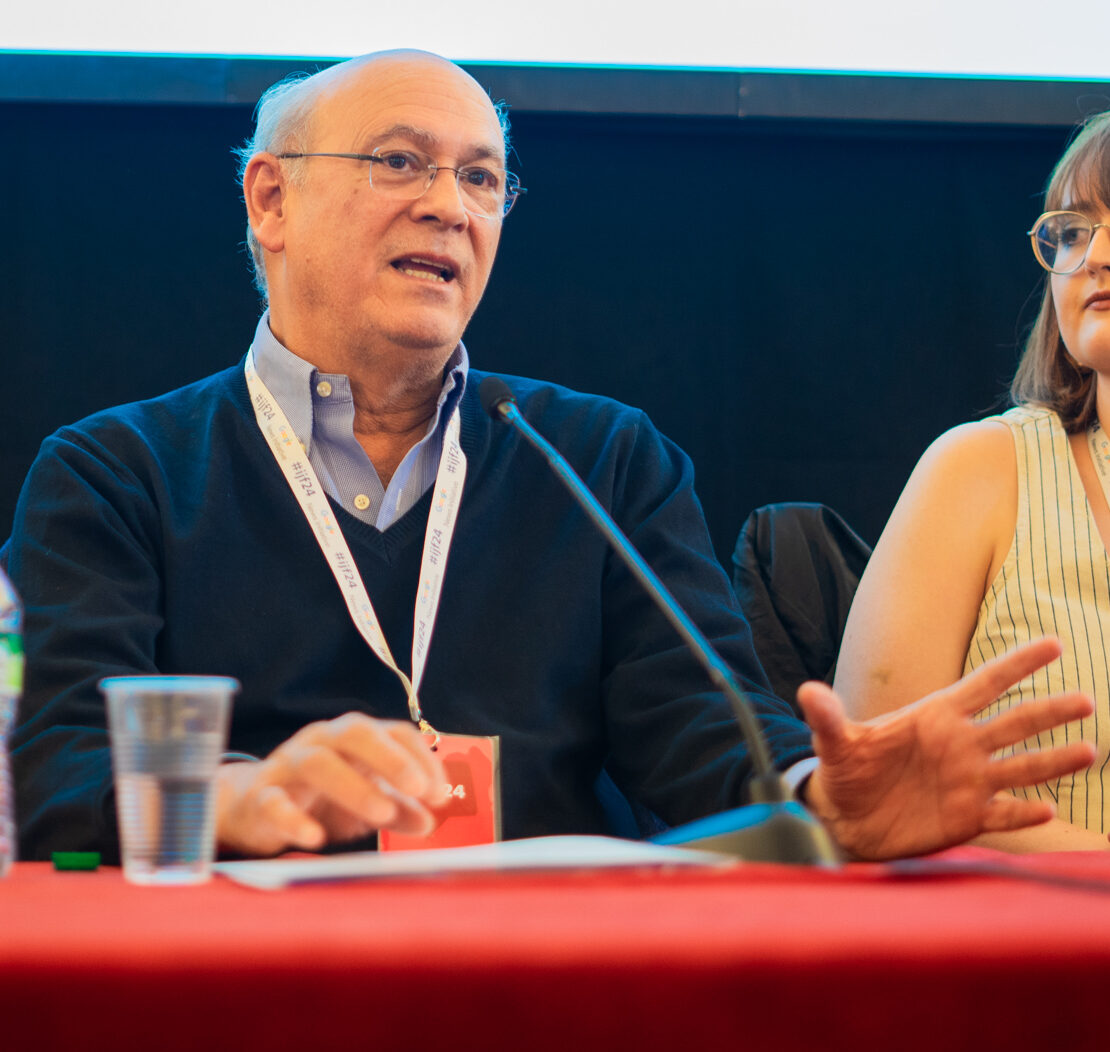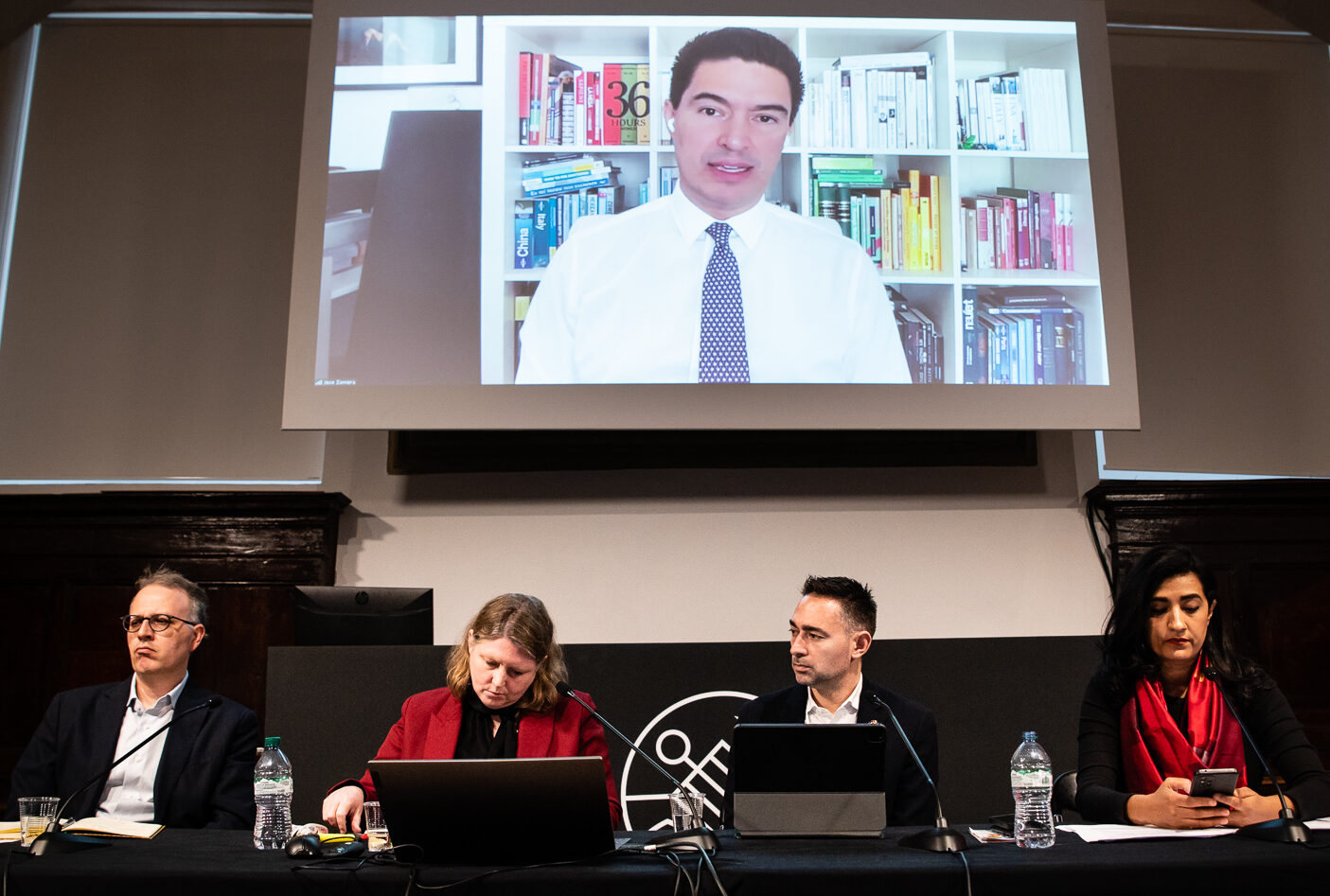Evaluating risks in coverage, building complete trust between editors and reporters, forming a legal defense and providing psychological care are fundamental elements that editors and media managers must take into account when dealing with multiple dangers, harassment and criminalization against journalists in Latin America today.
This is according to Carlos Dada, co-founder and director of Salvadoran digital media outlet El Faro, and Carlos Fernando Chamorro, founder and director of Nicaraguan media outlet Confidencial, who participated as speakers in panels on the safety and well-being of journalists at the 2024 International Journalism Festival, in Perugia, Italy.
For El Faro, which since its founding in 1998 has faced situations of insecurity due to its coverage of gangs, drug trafficking and corruption in El Salvador, risk assessment has been crucial to protect its journalists. Dada said that in high-risk situations, complete trust between editor and reporter and clear communication are key elements to keeping the team safe.
“Nothing works if there is no trust between editors and reporters. If you're a reporter and don't trust your editor, don't go to any risky place. And if you're an editor and you don't trust your reporter, or you don't know how to assess his own security, don't let him go,” Dada said during his participation in the panel “Can risk assessments keep journalists safer?” “You need to build trust, and that requires time, of course.”

Carlos Dada said that the risk assessment at El Faro is carried out through an emergency committee. (Photo: Francesco Cuoccio - Licensed under CC BY-ND 4.0)
The journalist explained that the risk assessment at El Faro is carried out through an emergency committee, which makes decisions regarding the safety of team members in dangerous situations. The reporter at risk must trust that the decisions made by the committee are the best for their safety and must follow their instructions even against their own instincts. That, Dada said, is very difficult to achieve, but once achieved, it is quite useful in ensuring the integrity of the team.
“When you are under big risk or threats, your perception of that risk is almost never equal to the real risk. It's usually higher or lower, depending on how you're feeling that day,” Dada said. “We found it [the emergency committee] was the better solution we could come up with to solve the problem of perception.”
Honest conversations between editor and reporter prior to coverage are key to building that relationship of trust in which the reporter can trust the editor with his or her life, Dada said. Once the reporter is on the ground, at least two people in the El Faro newsroom provide permanent monitoring and accompaniment throughout the duration of the coverage, the journalist added.
Dada said risk assessment and monitoring should also be part of protection measures for freelance journalists. If they don't have an editor with whom they can maintain close contact during dangerous coverage, they should get one, the journalist said.
“There's a lot of freelancers in El Salvador that we are friends with, that would call us when they go to do some work. We monitor them, and we assess them, and we work as their bouncing board,” he said. “The fact that you're a freelancer doesn't mean that you can go on your own on these risky coverages. You need to find someone that you trust to work as your bouncing board or risk advisor in these cases.”
Dada said that when he began to look for guides on how to evaluate risks in his newsroom, he mostly found journalist protection manuals aimed at media outlets in developed countries, which were not adaptable to the reality in El Salvador.
In recent years, in which polarization in El Salvador has worsened, and in which President Nayib Bukele's government has designated media and journalists as “public enemies,” challenges and threats against the safety of journalists have increased, Dada said.
Therefore, El Faro had to design its own protection strategies, considering, in addition to risk assessment, other elements such as legal defense, an international support network and psychological protection. Dada admitted they still have a lot of work to do in their newsroom with respect to this last area.
“We came up late to find out that it [risky coverages] has psychological effects on us. I think it was the last part that we really addressed, and I don't think we're very good at that, yet,” he said. “I think it's also a generation thing. For my generation, we were always more reluctant to accept that there were any psychological problems. For the new generations this is more natural, so they are the ones pushing us to do some things.”
Dada said that members of the El Faro editorial team have access to psychological support if they require it. And for employees who don't feel comfortable talking to mental health professionals, peer-to-peer conversations are another effective way of addressing the emotional effects of coverage, according to the journalist.
“I would just recommend everybody do that, to listen to your people,” he said. “You need people to be in good emotional health to properly do the job.”
Among the measures to safeguard the safety of a journalist who faces a threat due to his work is his temporary relocation, for which news media can turn to journalism support organizations.

Carlos Fernando Chamorro said that a journalist's decision to go into exile is a voluntary process that needs support and guidance. (Photo: Andrea Marchi - Licensed under CC BY-ND 4.0)
But when the threat is greater, the relocation could become permanent exile, and that process is much more complex to carry out, both for the journalist and for the media outlet where he works, as Chamoror said during the panel “Newsrooms putting journalists’ well-being first.”
For nearly three years, the entire Confidencial editorial team – including Chamorro – has been working from exile, after several years of judicial harassment by the regime of the president of Nicaragua, Daniel Ortega, which included the raid of its editorial office and confiscation of its equipment in 2018.
“The last decision to go to exile for a journalist is a very difficult decision. I went through that agony several weeks before making that decision. Nobody can impose that decision, you have to reach the conclusion that you have to leave, otherwise you would be silenced, or you would be in prison,” Chamorro said. “It's a voluntary process that needs support, that needs coaching, that needs persuasion.”
Exile represents multiple challenges, such as finding economic support in a foreign country, being separated from family and adapting to the permanent condition of being exiled, Chamorro said. However, he said that these challenges have been worth it, since no member of his editorial team is in prison.
“We were successful in terms of protecting our journalists and our sources. This second thing has been extremely important: how to provide secure channels of communication to keep this communication with sources, who are also criminalized,” he said.
The journalist said that, prior to the escalation of attacks against the press in Nicaragua in recent years, Confidencial used to have a program to monitor the well-being of its employees in the face of hostilities such as threats, harassment, blocking access to information or spying. However, working from exile, that program was outdated, he said, and now the priority is to preserve the freedom and integrity of its journalists.
“The meaning of well-being has changed through time. During times of so-called normality [...], we talk about well-being focused mostly on economic compensation, legal support, these kinds of things,” Chamorro said. “When we went through a process of criminalization, when our newsroom was raided by the police, not once, but twice, and that it became a crime in Nicaragua to be a journalist, well-being for us became equivalent of safety, of stability, resistance, resilience.”
The ability of a newsroom to provide security and well-being to its team is limited operating in exile, the journalist said. Therefore, employees who decide to migrate on their own or look for other job options outside of journalism are eventually lost.
“There were some young reporters that left our newsroom very early, because they said 'my family is putting a lot of pressure on me that I cannot stay in this newsroom because it's risky, because I'm going to be the subject of reprisals,'” he said. “All these decisions are voluntary, you cannot impose on people one thing or the other.”
The journalist said that navigating uncertainty is one of the greatest challenges in exile. Not only the uncertainty of the editorial operation, but also the political circumstances of his country. In Nicaragua, he said, the dictatorship is in a state of fragility and a transition to democracy could occur at any time.
“We don't know what's going to happen next. We are working for the week, for today, for this year 2024, but we don't have a budget for 2025, for 2026. We cannot think or plan in the long run,” he said. “The main problem, I would say, is how to adapt to a condition of uncertainty and permanent exile. This thing could change from one day to another, but we don't know when this day will come.”
Chamorro said that Confidencial's situation is not unique, and that there are other media outlets from countries like Cuba, Venezuela, and El Salvador working from exile. For this reason, he said, a new paradigm is required for journalism from exile that facilitates obtaining resources and offers a certain stability to newsrooms that operate outside their home countries.
“That requires, obviously, digital security, secure channels of communication, safety, but also allowing journalists also to grow up in this process of uncertainty,” he said.
In various parts of the world, the law is increasingly being used as a weapon to silence journalism and compromise the freedom, well-being and economic security of journalists. Lawyers have become the target of attack by authorities seeking to weaken the legal defense of a journalist in a judicial process.
This is according to participants in the panel “Defending the defenders: upholding justice in the face of lawfare,” which included José Zamora, chief of communications and impact at Exile Content.

José Zamora (on screen) spoke remotely about how the lawyers of his father, Guatemalan journalist José Rubén Zamora, have been persecuted in court. (Photo: Diego Figone - Licensed under CC BY-ND 4.0)
Zamora is leading the campaign for the release of his father, Guatemalan journalist José Rubén Zamora, founder of the newspaper elPeriódico, who has been in prison since 2022, accused of money laundering. Zamora, who participated on the panel remotely, said that the case against his father has been plagued by irregularities and violations of his rights, including harassment and criminalization of the 10 lawyers he has had throughout the process.
“The entire process was not only fabricated, but they violated all of his rights and one of those rights is the right to a legal defense,” Zamora said. “They started from day one during the first hearing. The judge said that there was a case against his lawyers and that they needed to be removed immediately. Then those first lawyers were imprisoned for almost two weeks. One of them has openly talked about being tortured.”
Zamora said that the actions of the Guatemalan Prosecutor's Office have benefited from a law through which defendants who accept the charges against them can avoid going to prison. Several of José Rubén Zamora's lawyers were accused of different crimes and allegedly forced to accept their charges under that law – some allegedly through torture – Zamora said.
“They accepted charges to get out [from prison], which really did impact my father's process,” he said. “Communications-wise, that's something the prosecutor's office always uses, like ‘oh, so his lawyers already accepted charges, so he must be guilty.’”
That tactic by judicial authorities continued until no attorney wanted to take his father's case because they knew the consequences they could face, Zamora said. In the last part of the legal case, the journalist has been represented by public defense lawyers, who have not been exempt from accusations and obstruction of their work.
Zamora explained that some of his father's public lawyers have suffered harassment and lawsuits, while others have been removed from the case overnight.
“In a way, they are part of the system, and the system is against them and they also attack them,” he said. “The public defense is very nervous about working with us because the system is on top of them. It's very hard to communicate with them. When you have a case like this and the entire system and the State going after you, it's very hard to work if you can't talk with your lawyers on a daily basis.”